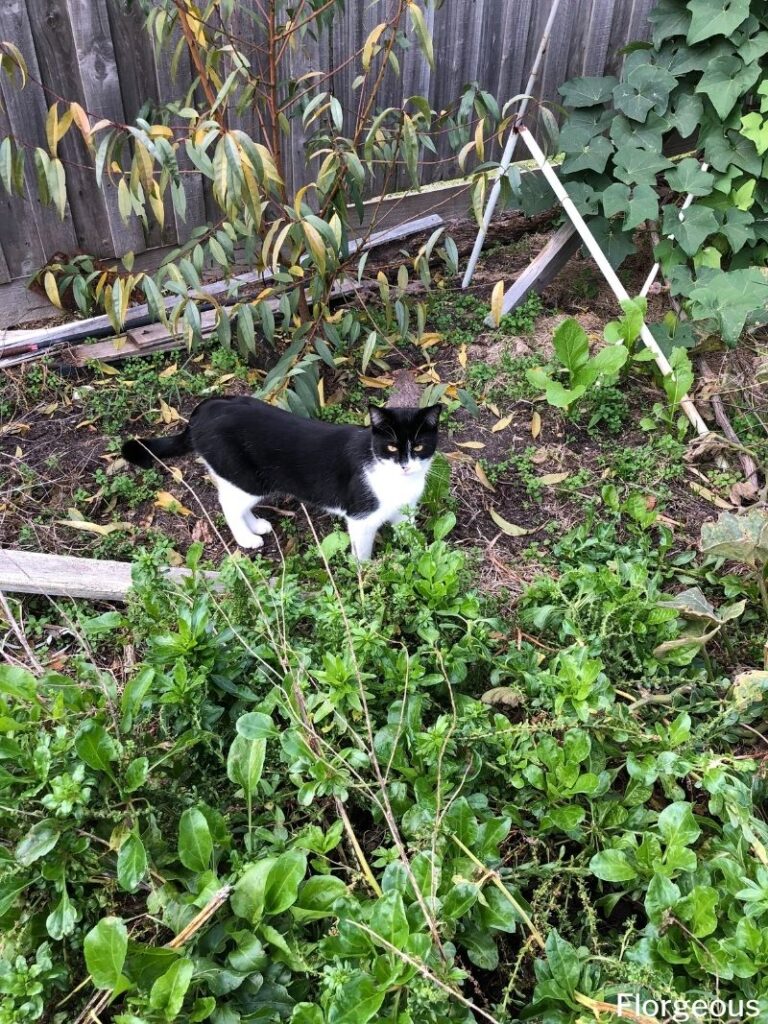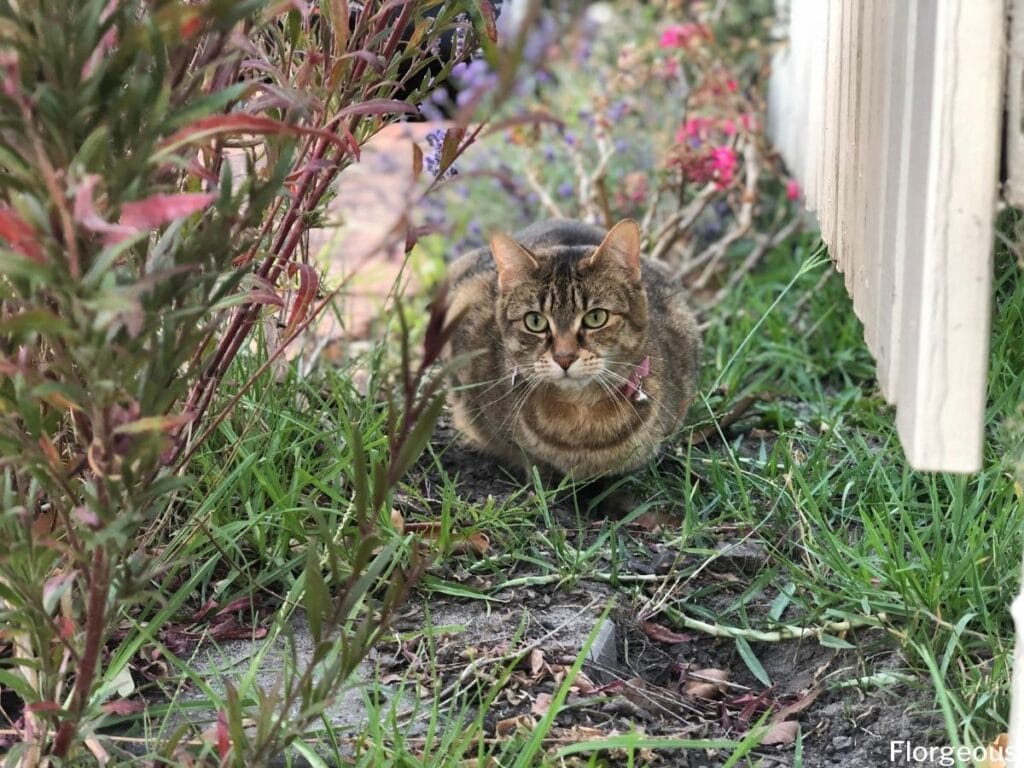If you have a problem with stray cats or neighbor’s cats in your yard, you’re not alone. Here are some tips for keeping them out.
Cats can be cute, cuddly, and fantastic pets. But what happens when your neighbor’s cat or stray cat won’t leave your yard alone? Cats can inflict serious damage to your property, so what can be done about it?
If you are having a feral cat problem, we have compiled a comprehensive guide detailing preventative measures to keep felines away from your property permanently.
Read below to find out more about how to get rid of cats in your yard including neighbor’s cats and stray cats. These tips apply to both types of cats.
What Are Stray Cats?
Stray cats or feral cats, at first glance, may look similar to domestic cats, but they couldn’t be more different. Sure, both stray and domestic felines have similar natural instincts such as hunting backyard birds and mice, spraying (for male cats), etc., but their physical and personality traits differ.
For example, domesticated cats are usually well-groomed. Their fur is soft and shiny, eyes clear of eye gunk. Additionally, domesticated cats usually have collars, therefore letting you know they have a home around the area to return to.
In terms of personality, domesticated cats are more open to human interaction. They typically don’t flinch away from humans and may even approach them.
Feral and stray cats are the opposite of domesticated cats. Their fur is usually unkempt and they can be visibly dirty. In addition, they are skittish around humans, their personalities noticeably more wild in behavior. In some circumstances, feral cats can be more aggressive toward you, your pets, or your children.
What Attracts Stray Cats?
There are three things that cats and stray cats seek out most: food, water, and shelter. If you have garden sheds, garages, or wood piles, cats will most likely seek out those shelters to be comfortable and even have kittens.
If you have food scraps laying around, trash cans near your yard, or like to barbecue, the feral cat will pick up on the aroma with their keen sense of smell and make their way onto your property. That being said, if you have a lot of birds in your area or like to invite birds into your yard, chances are that neighborhood and stray cats will use your yard as a hunting ground.
Finally, especially during dry seasons, cats will search for a water source. Bird baths, leaky hoses, and water bowls you leave outside for your pets all attract cats.
Now, this is not to say that you have to get rid of your shed and wood piles, stop eating outside, and stop feeding and watering the birds, but it does mean that you have to take some preventative measures to keep these cats away.
That said, it doesn’t hurt to remove your bird feeders, either. This can prevent more cats from getting into your yard.

How to Keep Cats Away From Your Property
Cats are wanderers and hunters. Their curiosity is persistent, causing them to keep exploring. So, how do you keep unwanted cats away from your property?
The best approach is to find out who the free roaming cats belong to. However, if you are dealing with a feral cat, that’s easier said than done. You need to take matters into your own hands.
Here are some additional preventative measures you have to take to keep a cat home – some great natural cat deterrents.
Plant Strong-Smelling Plants
Cats have an incredibly keen sense of smell which is why they come running whenever you barbecue or eat outside. However, that also means that a lot of strong, bitter smells deter them as well.
Consider planting rue, lavender, lemon thyme, absinthe, or geranium around your property. Most of these smells are pleasing to us, but not to cats and other wild animals.
Planting pennyroyal, a perennial herb, can be highly effective. Thankfully, pennyroyal plants have more functions rather than just deterring cats. They have healing remedies, culinary properties, and they are quite decorative for your yard.
Create an Uncomfortable Environment
As you may have noticed, cats, stray and domestic alike, love to lounge around and relax. Warm, soft environments that have a bit of sun attract cats like magnets. As a result, flower beds, your yard, and other shelters can become saturated in cat smells and can be used for female cats to have their litters.
To combat this, lay sharp stones, broken egg shells, or even chicken wire around your yard and flower beds. For your covered areas, make sure to have them tightly shut up so nothing can wedge itself inside.
The main goal is to disturb areas where community cats are most likely to feel comfortable without jeopardizing your own comfort.
Do Not Feed the Cats
Although it may be tempting to set out a bit of cat food and water for the cats, we would strongly advise you not to do this.
Setting out pet food will attract more and more stray and feral cats, causing an entire congregation of felines to loiter in your yard. Doing this increases the risk of spreading disease especially if the cats are all strays. Additionally, because the food is encouraging cats to make comfortable homes on your property, it might trigger the cat population to sky rocket, again, increasing the risk of spreading disease, fleas, and an overrun of cats.
You may have good intentions of setting out food and water, but it is better to refuse them food and contact local sanctuaries who have the knowledge and resources to properly care for neighborhood cats.
Get a Dog
Dogs are great for keeping away cats, squirrels, and other critters from destroying your yard. A dog’s presence is usually enough to keep the cats away.
With this method, it is absolutely imperative that the dog is not aggressive toward these animals and simply chases them away. It is inhumane to send your dog after a cat or other animals to physically or fatally harm the animal.
If you do rely on your dog to keep cats away, make sure that it is not aggressive.
Do Moth Balls Keep Cats Away?
Moth balls do help with animal control, but it is advised not to use repellents such as moth balls. They include harmful fumes that could be dangerous for you, your pets, your kids, and other animals that might venture into your yard. However, there are health concerns on the potentially harmful properties of moth balls you should be careful when using.
Instead of mothballs, here are some safe, alternative natural cat repellents you can utilize.
Predator Urine
Predator urine is one of the most effective ways to keep not only cats away, but squirrels and other critters as well. You can spray the urine around your perimeter and cats will most likely stay away from your property.
Citrus Juice/Citrus Peels
Fruits such as oranges or grapefruits have an incredibly strong scent that cats turn their noses up to. Save your citrus peels and place them around your yard or garden. You can use any kind, including lemon peels or orange peels.
Or, you can squeeze some of the juice and spray it around. Make sure to replenish the scent after a heavy rain.
Other cat repellents that work similarly to citrus peels to prevent cats from digging up your garden include plastic mats sprayed with citrus aromas or even herbs. Cayenne pepper and the herb rue, in particular, can help prevent a feral cat from doing damage to your property.
Just sprinkle dried rue around the areas where you find cats, and it should stop free roaming cats from setting up shop.
Coffee Grounds
Coffee grounds have a similar effect as citrus or strong-smelling herbs. The bitterness of coffee may be pleasing to us, but is displeasing to cats.
Plus, they make for good nutrients for your garden plants! Again, make sure to replenish them after any heavy rain. FYI – pine cones work in a similar way. Leave these on your lawn if you find cats hanging around more often than you’d like.
White Vinegar
White vinegar can also help keep the cat population in your yard down. Cats don’t like the smell and taste so it’s a good method to deter cats, including feral cats. You will have to reapply after heavy rains, but this method can keep other wildlife away, too.
How to Keep Cats Away from My Front Door
Cats seem to love to post up on our front porches. They have a good view of the street and it is one of the most comfortable places to lounge. Here are some steps to take if you’re interested in keeping cats away from your front door.
Motion-Activated Pet Deterrents and Motion Activated Sprinklers
These motion-activated devices usually come in the form of ultrasonic sounds, flashing lights, or water features.
For example, the ultrasonic sound deterrents operate at a frequency that can not be heard by humans or dogs. Similarly, the flashing lights can mimic predator eyes which safely scare cats away. The most effective electronic deterrent, though, is most likely motion-activated sprinklers which spray encroaching cats and scare them away.
Most cats don’t like water to begin with so to be surprised by a spray of water, they’ll likely not come near your property again.
Citrus-Scented Spray
As stated previously, cats hate citrus. You can purchase lemon or orange-scented spray to mist around your front door, porch, or walkway up to your door to deter neighbor’s cats. Peels work great as well.
You can also spray scents around your garbage cans if you find that your trash is serving as free food sources to free roaming cats.
Aluminum Foil or Rough Terrain
Although not as effective as the above two deterrent methods, aluminum foil might work for you. Cats’ paws like soft, pleasant walkways. Therefore lining walkways with aluminum foil with its reflective and crinkled surface can deter cats.
Even some sharp edged mulch or flexible plastic spikes can help prevent cats from digging up your yard or garden.
Alternatively, you can place rough stones as your walkway up to your front door to discourage cats from walking up to your porch.
How to Keep Cats from Pooping in My Yard
Cat feces, particularly those of unvaccinated cats, are filled with harmful microorganisms. Not only that, but no one wants to pick up additional poop from their yard. Here are some tips to prevent cats from pooping in your yard.
Stay Away from Sand Boxes
Although sandboxes might be fun for your little ones, it is best to steer clear of them altogether. Sand is close to what they’ll find in a litter box and the preferred method of “doing their business” for cats. Therefore, it is easy for diseases to spread to children or other animals when a sandbox is present.
Either stay away from sand boxes or create a chicken wire barrier to discourage cats from using your sandbox as a litter box.
Wash Away the Smells
Cats seek places that smell like them or have been marked by other cats. Assess where cats may frequent your yard and consistently wash away their scent. It is recommended to use a nontoxic deodorizer that can attach to your hose for maximum effect.
However, water can work just fine as long as you are thorough.
Tips for Getting Rid of Stray Male Cats
Stray male cats are relentless especially when it comes to sensing a female cat’s heat cycles. Here are a few ways to get rid of stray male cats.
Get you Female Cats Spayed
To prevent male cats from seeking out your female cat, get them spayed. This is the best method of preventing male cats from prowling around in your yard, looking for a mate.
Keep Female Cats Inside During Heat Cycles
If you don’t want to get your female cat spayed, make sure to keep her inside during the entirety of her heat cycle. It is extremely important to ensure she doesn’t get outside for risk of getting pregnant and having male cats brawl in your backyard.
Keep Up with Deodorizing Your Backyard
Unfortunately, male cats spray a lot. Their own scent marks their territory and keeps them and other male cats coming back to your yard. Make sure to spray down sheds, walls, fences, or any other areas that the car frequents.
How to Get Rid of Stray Cats Permanently
Now that we know some great preventative measures for keeping cats out of your yard, how do we remove them permanently? Here is a list of methods to help keep cats away permanently.
Support Local Shelters and Sanctuaries
Collaborating with your local shelters or sanctuaries is one of the most effective ways to keep cats away for good. These professionals know safe and professional ways to catch and release stray cats and keep them away from your neighborhood.
Collaborate with Your Neighbors
It’s most likely that you are not the only one in your neighborhood with a cat problem. If a cat or two is frequenting your yard, chances are they are visiting your neighbors’ yard too. Talk with your neighbor and ask if they’ve been having a cat problem.
Then, you can team up and go through preventative measures together.
Humane Traps
Spring-loaded traps are the safest, most effective trap to catch cats in your yard. After you’ve caught one, you can call animal control to pick it up and release it in a safe area.
How to Get Rid of Neighbor’s Cats in My Yard
Sometimes, stray cats might not be a problem, it might be that your neighbor’s cat likes to wander. If your neighbor’s cats come to your property, it is best to calmly approach your neighbor about their cat. Ask if they could keep an eye on them or install preventative measures within their own yards! If they don’t seem to be cooperating, you can write them a firm, professional demand letter.
Make sure you check the local laws in your area to make sure you aren’t violating any by attempting to get rid of cats, either. If the feral cat population in your area is growing quickly, you might need to contact the local authority such as animal control agencies or local animal shelter.
Otherwise, try out any one of these preventative techniques or a combination of them! The most important thing to remember is to create an environment that is not pleasing to cats. Try one or a combination of these techniques to figure out which one works best for you!
See more:







